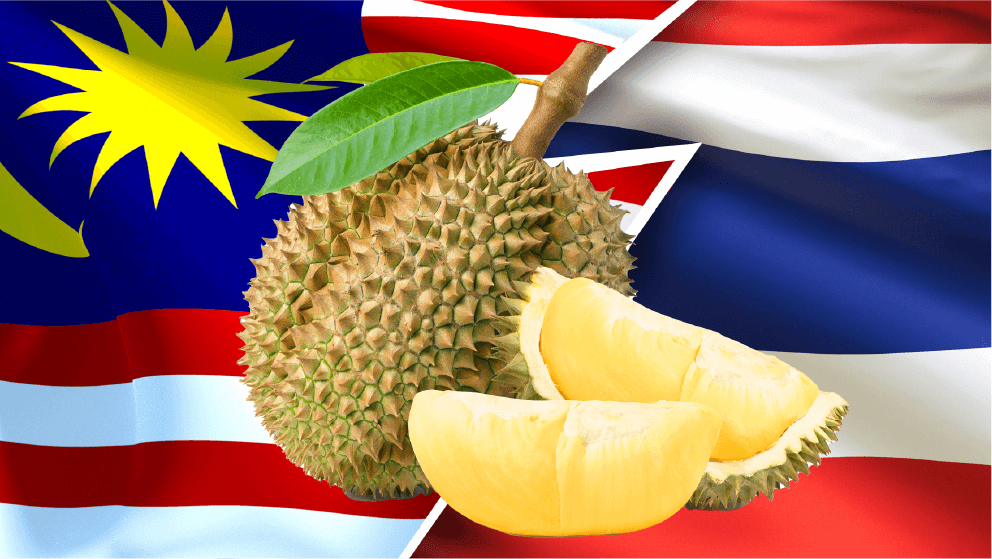Many people around the world consider the durian “the king of all fruits”. This large spiky fruit can be found on trees throughout Southeast Asia, where it has traditionally been popular amongst locals. However, as more and more people become interested in this unique-tasting delicacy, the market demand for durians has skyrocketed, making the durian industry highly attractive for exporters in Malaysia.
Durians, such as the well-loved Musang King and Black Thorn variants, are an integral part of Malaysian and Southeast Asian culture. The rise of e-commerce as a platform for selling durians online and more advanced durian shipping logistics has also streamlined the global export of durians, making the fruit more accessible and affordable for new markets and consumers.
Top durian exporters in the world
Heightened global demand is reflected in key figures across the board. In 2020, durian export by country data shows Thailand as the largest durian exporter. The country was responsible for a whopping 75.31% of global exports, which corresponded to a US$2.08B export value, according to data by Tridge Intelligence.
In the same year, Hong Kong had 21.23% of the worldwide durian market, followed by Vietnam’s exports, which accounted for just 2.64% of the total.
With a world market share in 2020 of about 0.64%, Malaysia earned US$17.70M from the bestselling fruit. The country is home to the popular Musang King breed and the hybrid Black Thorn durian. The only non-Asian country on the top five durian exporters chart, the Netherlands, accounted for about 0.06% of total world exports.
Popular durian import countries
The figures show massive growth on the import front. China has a huge appetite for durians, especially the Musang King variety, also known as Mao Shan Wang. The country spent US$2.89B on durian imports in 2020. This made the nation the number one consumer of durians worldwide, accounting for 79.92% of global imports.
Hong Kong followed far behind with durian imports worth US$628.57M for the same year. This was 17.4% of imports recorded worldwide. Taiwan was next with 0.9% of global imports, which amounted to US$32.45M. Not too far behind was Singapore, with 0.31% of world imports. Last but not least, the United States of America has a growing durian market, with a global import share of about 0.29% in 2020.
How has COVID-19 impacted the durian industry?
With widespread lockdowns and business closures worldwide, the pandemic has had a major impact on the durian industry and durian export supply chain across borders. While travel restrictions and disruptions have posed their fair share of challenges to durian exporters, the future of the industry remains bright.
1. Flourishing demand for durians
In early 2020, when the world first began grappling with COVID-19, the Malaysian durian industry temporarily faced a demand slump and manpower shortages. This was due in part to movement restrictions hindering farm operations.
However, since then, the market demand for durian has picked up the pace once again. The import industry in China, which sees huge durian market demand, is growing fast.
Nothing illustrates China’s frenzy for durians more than the 2020 China-Malaysia durian festival, in which a jaw-dropping 60 tonnes of Musang King durian (roughly 300,000 fruits) were sold in under an hour. Durian sellers in Malaysia also saw a spike in demand for Musang King from Hong Kong as online delivery orders surged.
2. The shift towards e-commerce
As durian entrepreneurs scrambled to find new buyers, e-commerce started to play a more important role in how businesses are run. Instead of using traditional wholesale markets, many companies are now opting to sell durian online through established platforms like Alibaba and eBay, or by launching online stores of their own.
This gives businesses access to more potential customers than ever before, even allowing them to reach customers outside their country. That being said, successful online sales also requires efficient international shipping of durians from Malaysia. The Durian Express initiative by DHL Express Malaysia aims to do just that by helping local durian businesses fulfil overseas demand in Hong Kong and Singapore with next-day delivery services in under 24 hours.
Additionally, the increased demand has also helped exporters sell directly to consumers instead of going through intermediaries or distributors. The online sale of durian allows companies to tap on a new sales channel to generate revenue.
With all these benefits that e-commerce provides, it is likely that more durian companies, especially those in Malaysia, will start adopting this business model in the future.
















































